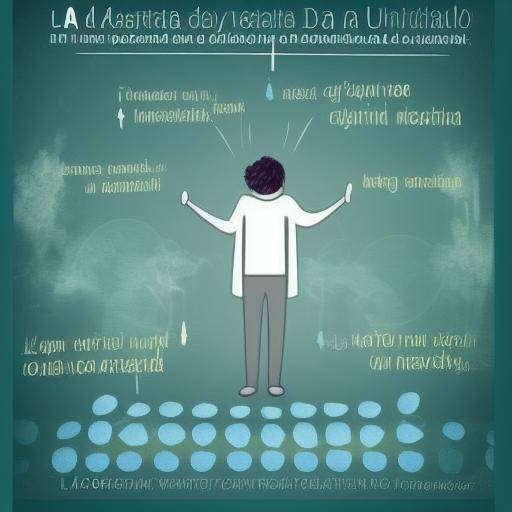
Self-confidence, persuasion skills and emotional well-being are fundamental elements in people's lives, both at personal and professional levels. In this article, we will explore in depth how self-confidence impacts effective persuasion, its relevance in various areas and its influence on emotional well-being. From its history and evolution, to practical advice, future predictions and answers to frequent questions, this comprehensive analysis will provide a complete understanding of these critical issues.
Introduction
The ability to persuade and convince others is a highly valued skill in the current world, whether in the labour, social or personal sphere. However, success in persuasion is closely linked to self-confidence, which acts as the foundation upon which the ability to influence others is built effectively. In this article, we will explore how self-confidence is a determining factor in persuasion, as well as its impact on emotional well-being.
History and Background
Self-confidence has been the subject of study and reflection throughout history, from ancient philosophies to modern theories. The concept of self-confidence dates back to the teachings of great philosophers such as Socrates and Aristotle, who recognized the importance of self-confidence to attain excellence.
Over the centuries, self-confidence has been explored from various perspectives, including psychology, sociology and neuroscience. As the understanding of the human mind and behavior has evolved, so has our perception of self-confidence and its role in society.
During the 20th century, influential figures such as the social psychologist Albert Bandura revolutionized the understanding of self-confidence by introducing the concept of "self-efficacy," which refers to belief in one's own ability to achieve goals and face challenges. This notion has been fundamental in the modern understanding of self-confidence and its impact on personal and professional realization.
Analysis in Deep
Self-confidence not only influences the way we relate to ourselves, but also our ability to influence others. People with high self-confidence tend to be more persuasive, as they project security, conviction and credibility in their interactions. This positive influence extends to both the workplace, where persuasion is key to leadership and decision-making, as well as to the personal sphere, where the ability to persuade can significantly affect interpersonal relationships and emotional well-being.
The ability to persuade, on the other hand, is enhanced by self-confidence, as those who trust their own abilities tend to communicate their messages more clearly, conviction and persuasion. In an increasingly interconnected and competitive world, the ability to influence others has become a fundamental asset, both individually and organizationally.
Emotional well-being, in turn, is closely linked to self-confidence and effectiveness in persuasion. People who feel confident of themselves tend to experience higher levels of well-being, as they are better equipped to face challenges, manage stress and build positive relationships.
Comprehensive review
The application of self-confidence, persuasion skills and emotional well-being can be seen in a variety of contexts, from business leadership to everyday interactions. In working environments, self-confidence can be decisive for success, as self-confident leaders are able to inspire and mobilize their teams towards ambitious goals. Similarly, persuasion skills play a crucial role in negotiating, selling and resolving conflicts, where the ability to influence others' decisions can have a significant impact on results.
In the personal realm, self-confidence and persuasion skills are essential for solid relationships, constructive conflict management and personal goals. Emotional well-being is influenced by these skills, as a solid self-confidence and effective persuasion capacity contribute to healthy self-esteem, satisfying interpersonal relationships and a sense of overall satisfaction in life.
Comparative analysis
Self-confidence, persuasion skills and emotional well-being are interconnected in multiple ways. While self-confidence serves as the basis on which effective persuasion capacity is built, emotional well-being acts as the result of a balance between both. Self-confidence and persuasion skills are critical interpersonal skills that not only impact our ability to influence others, but also influence our perception of ourselves and our ability to manage stress and overcome challenges.
Practical Tips and Recommendations
Developing effective self-confidence and persuasion skills is a continuous process that can significantly enrich personal and professional life. Some practical tips for strengthening self-confidence include identifying and challenging limiting beliefs, establishing realistic goals, practicing self-compassion and seeking support from mentors or practitioners.
As for persuasion skills, it is essential to develop the ability to listen actively, understand the needs and concerns of others, communicate clearly and effectively, and generate confidence through authenticity and consistency.
To promote emotional well-being, it is crucial to cultivate healthy habits, manage stress effectively, promote meaningful connections with others, and seek balance between the demands of working and personal life.
Conclusions
In short, self-confidence, persuasion skills and emotional well-being are intrinsically related and play a crucial role in people's lives. Strengthening self-confidence and developing effective persuasion skills not only positively impacts the ability to influence others, but also contributes significantly to emotional well-being and a general sense of personal realization.
Frequently asked questions
1. How can I develop my self-confidence?
Developing self-confidence involves challenging limiting beliefs, establishing realistic goals, practising self-compassion and seeking support from mentors or mental health professionals.
2. What is the importance of persuasion skills in the working environment?
In the working environment, persuasion skills are fundamental to negotiating, leading teams, selling ideas and products, and effectively resolving conflicts.
3. How does self-confidence influence emotional well-being?
Self-confidence influences emotional well-being by providing a solid basis for challenging, managing stress and establishing satisfactory relationships.
4. What role does self-confidence play in decision-making?
Self-confidence influences decision-making by providing the necessary security to confront uncertainty and assume calculated risks.
5. Is it possible to improve persuasion skills over time?
Yes, persuasion skills can be improved over time through practice, constructive feedback and development of empathy and emotional intelligence.
6. What are some strategies to improve emotional well-being at work?
Strategies to improve emotional well-being at work include setting healthy limits, cultivating support relationships, practicing gratitude and focusing on the balance between work and personal life.
In conclusion, the development of self-confidence, effective persuasion skills and emotional well-being is essential to achieving personal and professional success. These elements are not only interconnected, but also mutually reinforcing, significantly affecting the way we relate to ourselves and others. In understanding the importance of these aspects and implementing strategies to strengthen them, we can cultivate a more balanced, successful and successful life in all areas.
In addition, self-confidence, persuasion skills and emotional well-being are fundamental to developing meaningful relationships, reaching ambitious goals and experiencing a lasting sense of personal satisfaction. By strengthening these aspects, each individual can enhance their influence, generate a positive impact on their environment and achieve greater emotional well-being in their daily lives.






















































